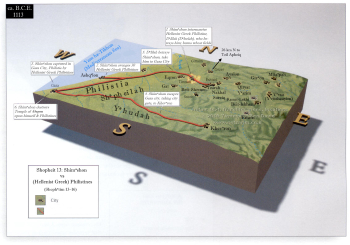
 |

After selling Yo•seiphꞋ into slavery, as his brothers were returning home with their tzon to Khë•vᵊr•onꞋ, YᵊhudꞋâh left the group to visit a man in AdulâmꞋ named Khir•âhꞋ. While there, a Kᵊna•an•itꞋ girl, a Bat-ShuꞋa, caught his eye; and YᵊhudꞋâh arranged with him for the girl, whose first name is never recorded to be his common-law wife.
YᵊhudꞋâh and this Kᵊna•an•itꞋ Bat-ShuꞋa, had three sons together: Eir, O•nânꞋ and later, Sheil•âhꞋ.
When his first-born, Eir, became an adult, YᵊhudꞋâh arranged a wife for him. Her name was Tâ•mârꞋ.![]() But Eir was bad in the Eyes of é‑‑ä and é‑‑ä killed
But Eir was bad in the Eyes of é‑‑ä and é‑‑ä killed![]() him, leaving Tâ•mârꞋ a widow with no child to inherit the first-born's double-portion.
him, leaving Tâ•mârꞋ a widow with no child to inherit the first-born's double-portion.
So, according to the ancient Middle Eastern custom, YᵊhudꞋâh instructed O•nânꞋ to sire a child with her. But O•nânꞋ, knowing that the child—and the child's inheritance—would not be his, performed only part of the mi•tzᵊwâhꞋ, refusing to complete the mi•tzᵊwâhꞋ.![]() This was bad in the Eyes of é‑‑ä and é‑‑ä killed
This was bad in the Eyes of é‑‑ä and é‑‑ä killed![]() O•nânꞋ too.
O•nânꞋ too.
YᵊhudꞋâh's youngest son wasn't yet old enough to sire a child. So YᵊhudꞋâh instructed his daughter-in-law, Tâ•mârꞋ, to go back home to her father's house and wait until Sheil•âhꞋ reached puberty so that he wouldn't fail to sire a child and die like his older brothers had. So Tâ•mârꞋ went back home to her father's house.
 |
After many days had passed, Bat-ShuꞋa, YᵊhudꞋâh's wife, died.
After a respectable period of being comforted as a widower, YᵊhudꞋâh and his friend from AdulâmꞋ, Khir•âhꞋ, herded their tzon toward Ti•mᵊn•âhꞋ to shear them.
Meanwhile, Tâ•mârꞋ had lived in her father's house a long time and Sheil•âhꞋ had become an adult. But YᵊhudꞋâh seemed to have forgotten his promise to her. She heard about their trip and she thought of a way to conceive her own child—YᵊhudꞋâh—and ensure her inheritance. She took off her widow's mourning clothes, concealed her identity with a veil over her face, disguising herself as a prostitute, hanging around the village gate of Ein•aiꞋim—which YᵊhudꞋâh had to walk by on his way to Ti•mᵊn•âhꞋ..
As YᵊhudꞋâh and his friend were herding their tzon by Ein•aiꞋim, he noticed the fetching figure of the young girl whose face was hidden behind a veil, and assumed she was a prostitute. He didn't know she was his daughter-in-law.
Seeing the fetching, apparent prostitute, he flared out the tzon toward her along the way. "Come, let me come to you," he called to her.
"What will you pay me?" she inquired.
"After the flocks are sheared, I'll send you a kid," he responded.
"What will you pawn to me in the meantime as collateral?" she bargained.
"What do you want?" he asked.
"Your signet ring, your pᵊtilꞋ and your tribal scepter-staff," she negotiated.
So YᵊhudꞋâh gave them to her and went in to her.
And she became pregnant by YᵊhudꞋâh. Then she went off, removed her veil and put her widow's mourning clothes back on.
When YᵊhudꞋâh sent his friend, Khir•âhꞋ of AdulâmꞋ, to deliver the kid to her and bring back his collateral, Khir•âhꞋ couldn't find her. When he asked around among the men of Ein•aiꞋim they all denied that there had been any prostitute there.
So Khir•âhꞋ returned to his friend, YᵊhudꞋâh, reporting, "I couldn't find her in Ein•aiꞋim, and the men there said there hasn't been any prostitute there."
"She's taken my collateral," YᵊhudꞋâh concluded. "Let her keep it or we'll be shamed. I kept my word. I sent the kid, but you couldn't find her."

Optional parental preparation:
Parents may want to consider, based on the child's age, etc., what parts of this story to present. ![]()
What this means isn't clear, and has long been the subject of wide debate. It could mean simply dying prematurely. Or it could mean that each, specifically described in the text as øÇò, was executed in consequence of some felony. Or, in the days before development of a Beit Din system, it could mean an honor killing. ![]()
Only her first name was recorded, suggesting that (contrary to baseless speculation two millennia later in Ta•lᵊmudꞋ Ma•sëkꞋët Sot•âhꞋ 10a and bᵊ-Reish•itꞋ Rab•âhꞋ 85.9), like YᵊhudꞋâh's (and Yo•seiphꞋ's) wife, she was also a daughter of a Kᵊna•an•iꞋ ![]()
Coitus interruptus – Parents are alerted to be prepared how, depending on the child's age, they may want to approach explaining how completing only part of a mi•tzᵊwâhꞋ is unacceptable and judged as bad. ![]()
Questions you might anticipate that your child might raise and be prepared to discuss:
What's a common-law wife?
What does pawn mean?
What is collateral?
What is bargaining and negotiating and how does one succeed in bargaining and negotiating?
![]()
 |
 |